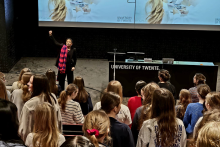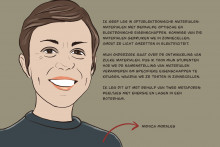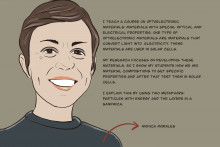For this article we talked to seven UT scientists, all from different backgrounds and fields. In their own words, these women share their experiences of making the career step from assistant to associate professor. While all their stories are unique, they also reveal common themes, such as need of direct support, the importance of external recognition and differences between tenure trackers and ‘other researchers’.
‘People told me that I was not ready’
‘I’ve had my own struggles, especially being a foreigner from a traditional family, it hasn’t been an easy journey for me. I started at the UT as a postdoc in 2012. In 2014 I got my Veni grant, which put me on the list of potential candidates for promotion and for getting on the tenure track. And that is when the real struggle began. I wanted to get to the position of an assistant professor, but I got so many negative comments. I was told that I was too ambitious for a mother, that I was too ambitious for a female, that I should focus on my family instead. I couldn’t understand what I was doing wrong. In the end I got an assistant professor position in 2016 but not on the tenure track.
Afterwards the next struggle began: having my own research group and to move one step further on an academic ladder. People told me “why rush? You are not even on the tenure track.” People told me that I was not ready. I was told that an assistant professor means “an assistant to the professor”. I couldn’t believe that was me. In 2019, I started my group and was ready to make the next step. It took me a lot of convincing but eventually I was promoted.

At that point I realized that I needed a change. I had a talk with the HR and the dean. They realized my struggles and supported me. In 2020, I moved to another group with the aim to realize my ambitions and vision, and to be on the tenure track. I realized that your mentors influence everything, especially your career development. It’s important that male professors realize women can have ambitions. It really hurts if they tell you to be less ambitious. Apparently I’m too ambitious to be a woman.
Sometimes I feel like it would have been much easier if I was a Dutch man. As women, we have too many responsibilities and the constraints really break you. It would be nice to have mentors that support you, because they walked the same path and know your struggles. Now universities try to promote female scientists, but they seem to focus on quantity, not quality. You should not focus on numbers – just don’t make it difficult for women, give them equal chances. If you are driven and ambitious, it doesn’t matter if you are male or female.’
'External recognition is critical in this process'
‘I arrived at the UT in 2018. My situation was a bit different, because I came here with more years of experience than a usual postdoc. I already managed a small group, I was supervising students and so on. That is why I told the UT that I wanted to make the steps in my career faster than is usual. However, even though I made this request, not much action was taken – at least not until I got my ERC grant and received the Aspasia funding from NWO. Then suddenly things started happening.
For me, the step to associate professor was possible thanks to three aspects. Firstly, I requested to move faster than normal, but that didn’t have much effect. Secondly, a big personal grant. And lastly – and most importantly – being on the Aspasia list. That was the push that really made the difference. You could receive the Aspasia funding only if the faculty agreed with the promotion to associate professor within a year. I believe this external push was the most important part of the equation. External recognition is critical in this process. I think I would have made the step even without this, but it would have taken me longer.

Is making the step to associate professor more difficult for women? Intellectually: absolutely not. It is the same. The step is just difficult, for both men and women. It is very hard because of the requirements you need to fulfil. You need to teach, you need to do research, you need to get a big grant, you need to organize and get invited to conferences, you need to be a member of a panel and so on. Combining all of that can be a lot, and for some even more so if they are building a family. That is the general academic system, this is not specific to the UT of course.
I don’t think we should make the step easier. It should remain competitive and based on excellence, but at the same time we should be offering support based the individual’s goals not applying the same requirements to everyone. You need to still focus on excellence, but that can have many forms.’
‘It is really important to have people who are lobbying for you’
‘I became an assistant professor in 2012 and I was promoted in 2019. At first I didn’t really think about the next step. After I decided it was an opportunity I wanted to pursue, it actually went pretty fast. I mentioned it in January during my annual meeting and in November I was promoted. People around me were really positive about it, so that is why I decided to go for it. Although not everyone was positive. There were people who told me I wasn’t ready. It was really helpful that I had a couple of people in the department who were on my side. In this situation it is really important to have people who are lobbying for you.
To get promoted, you need to look at the UFO criteria but those are actually really vague. They are not really quantitative, it is not clear what you need to do in order to make the next step. I asked HR about the formal procedure, but they replied that there were too many associate professors in my department, and so I didn’t have a chance to be promoted. I had to ask them several times to even get information on the formal procedure. Eventually I decided to look at the tenure track criteria for promotion because those are much easier to interpret. I’m not in the tenure track but I figured the same criteria must apply to some degree. In the end I approached people who made the step and asked them for their help and experiences.

It would have been much harder to make the step if I didn’t have the support of my colleagues. Without that, it would be very difficult to get the recommendation letter from the department chair which essentially seems to be the most important part of the process. Also, I got a Veni which makes it much easier. I think colleagues without such a grant struggle more.
I think it would be helpful if the possibility of promotion was a standard point in the annual interview with your supervisor. There should also be more clarity on the process. The criteria are so vague. I also had a mentor who really helped me. It was really helpful to have the outside view. But if you are not in the tenure track, it seems that the focus on your career is missing. You have to be proactive and ask for a chance and that might be something that women are less inclined to do.’
‘Some male colleagues are better in selling themselves’
‘I’m in a tenure track and I believe that it makes a difference, at least for me. You are kept on track, there are regular assessments. I hope to make the step to associate professor in one and half years. Being in the tenure track can be confusing for people, though. Many colleagues have questions about it. As a tenure tracker, it is not your manager who determines when you are ready for promotion or not, it is up to the committee. It can be difficult to assess how the decision is made. I was the first tenure tracker in the Civil Engineering department, so people didn’t know what to think of it. Some found it strange that you are hired to become a professor and wondered what it meant for other ambitious colleagues.
The number of full female professors is quite high at our department, but at the same time I don’t have many female colleagues. When I started here, I was actually the only woman in my group. Also, to my knowledge there are almost no female associate professors in the entire department. I often feel that it is easier to get a higher position if you come externally, rather than applying internally. I witnessed colleagues who could not get promoted at their university and so they left. I even heard that for my position funding specifically for women was used. Does that mean that we always need special funding to get a position? That would mean it is not based on our qualities and I find that hard to believe.

One reason the number of female associate professors is so low might be because we focused so much on hiring full professors, not levels below. I’m also not sure how many women actually want to become professors. I heard female colleagues say that academia was too hard for them, that it was too competitive. They already left before even trying to become a staff member.
I have experienced that some male colleagues are better in selling themselves than women. I try to learn from that. The tenure track requires selling yourself, you are pushed to do that. You have to make a list of what you are good at, look at what you achieved. Because of this I feel that women are better off on a tenure track. It is difficult to generalize, but it definitely helps to not be too modest if you want to be promoted. And again – difficult to generalize but – men seem to be better at not being modest.’
‘There is a stereotype of a successful researcher’
‘For me the most difficult career step was to move from Assistant professor (UD) 2 to UD1. Already at that point, the tenure track committee wants to see a mature candidate with a clear vision. It was difficult for me to find my own branding. I was working in a multidisciplinary environment, which was extremely inspiring but made it a bit harder to find my own vision. As a PhD or Postdoc, you work on projects, someone else defines what you work on. But later on, you need to find the thing that makes you unique, that only you can do. I found the step to associate professor somehow easier because, at that point, the game is already clearer, your research is better defined and you have learned how to brand yourself.

In the tenure track, the time path is stated at the beginning of the career and a committee evaluates your achievements regularly. That makes it easier to plan and arrange things in practical sense, but also puts a lot of pressure on you. On the other hand, I heard that when you are not in the tenure track, you really need somebody to support your cause for each career step. But, of course, you need support regardless. My boss has always been extremely helpful and supportive and the dean was also an important mentor for me. I felt really appreciated, which helped me a lot. I also realized that it takes a while – especially as an international – to understand how things work, how the game is played. When I arrived, I felt I missed the story behind the scenes, I didn’t understand the mechanisms. You need time to get used to that and someone to answer your questions.
The issue why less women are at the level might have to do with the type of recognition we receive as scientists. There is a stereotype of a successful researcher – man, white, young and entrepreneurial - and many women don’t check those boxes. On top of that, many women want to check all the boxes before they even ask for a promotion. Men, in general, understand that they don’t need all five boxes. Three is just fine.’
‘It seems easier to make the step if you move from one university to another’
‘F or me getting the position of associate professor was okay. I moved to the UT from Tilburg and got the position straight away, after being an assistant professor for a long time. I felt it was too difficult to get a promotion in Tilburg and I wanted to find a group that was a better fit for my research, so I decided to send an open letter to the UT. It seems easier to make the step if you move from one university to another, because universities are always trying to attract external talent. If they really want you, they are more likely to give you what you ask for. But after they have you, it seems more difficult.
or me getting the position of associate professor was okay. I moved to the UT from Tilburg and got the position straight away, after being an assistant professor for a long time. I felt it was too difficult to get a promotion in Tilburg and I wanted to find a group that was a better fit for my research, so I decided to send an open letter to the UT. It seems easier to make the step if you move from one university to another, because universities are always trying to attract external talent. If they really want you, they are more likely to give you what you ask for. But after they have you, it seems more difficult.
The bar for making it to associate professor is high for everyone, not only women. Luckily, I work in a department where the issues of bias against women exist a lot less, because the leader is aware of them and makes sure they don’t happen. It helps a lot to have a good person on top who is aware of these potential pitfalls. But the step is hard, because you need to have a lot of grant money in order to be promoted to associate professor. Not even a lot of small grants will cut it, you need one of the big ones. And those are often more like a lottery and they depend on the committee. One year they might love your idea and the next they hate it.
I think the UT could do more in terms of creating awareness and making the requirements for promotion more objective. Yes, there is a list of requirements but there can still be subjective bias when selecting the person to promote. It might also help to not mention gender on the application, although this will of course not help once you reach the second round of interviews and meet the committee in person. Still, at that point people would have already formed a certain impression before the gender aspect came to play.’
‘It doesn’t happen overnight’
‘When the promotion went through, it went smoothly. The whole process lasted about a year. But I learnt that it doesn’t happen overnight. People need to get used to the idea. What I think gave me a big push was that I was included on a list of Rising Stars in Computer Communication. That made a lot of noise and I think it really helped me in the process. Because on top of scientific output, you need something that makes you stand out. External recognition is really helpful.
I made the decision to take the next step together with my supervisor. I was always clear that I wanted to move on and have a career. I don’t want to stand still. At all points of my career I was asking myself what suited me, where I wanted to go and if it was also good for my environment. Because you don’t do this alone. You need support. After I agreed with my supervisor, I had to fill in some evaluation forms, but there was no committee interview. It was an internal process. I don’t know exactly what happened behind the closed doors to get the position. I only know that there was support from my direct supervisors.

I think the moment you ask for the promotion is like the top of the arch. A lot of work comes before it and it takes a while for you to feel ready. A job in academia is difficult. There are expectations to travel, to manage projects, to teach, to be on boards and have evening meetings, to do research and so on. It is hard to combine all of that, but you have to make clear choices. Especially at the beginning of your career, you feel like you have to say yes to everything that comes your way. But later on I learnt that I had to say no. That is better for my peace of mind, my quality of life. If you don’t do that, your career runs you, not you it. You have to be clear on what your priorities are and people will respect it.
All in all, the promotion process went smoothly for me – thanks to all the work that came before. But maybe I’m not the typical story. I hear of people who have so many requirements to fulfil – grants to obtain, projects to run and so on. That will make it very stressful and nobody should need to do that – not men nor women.’








